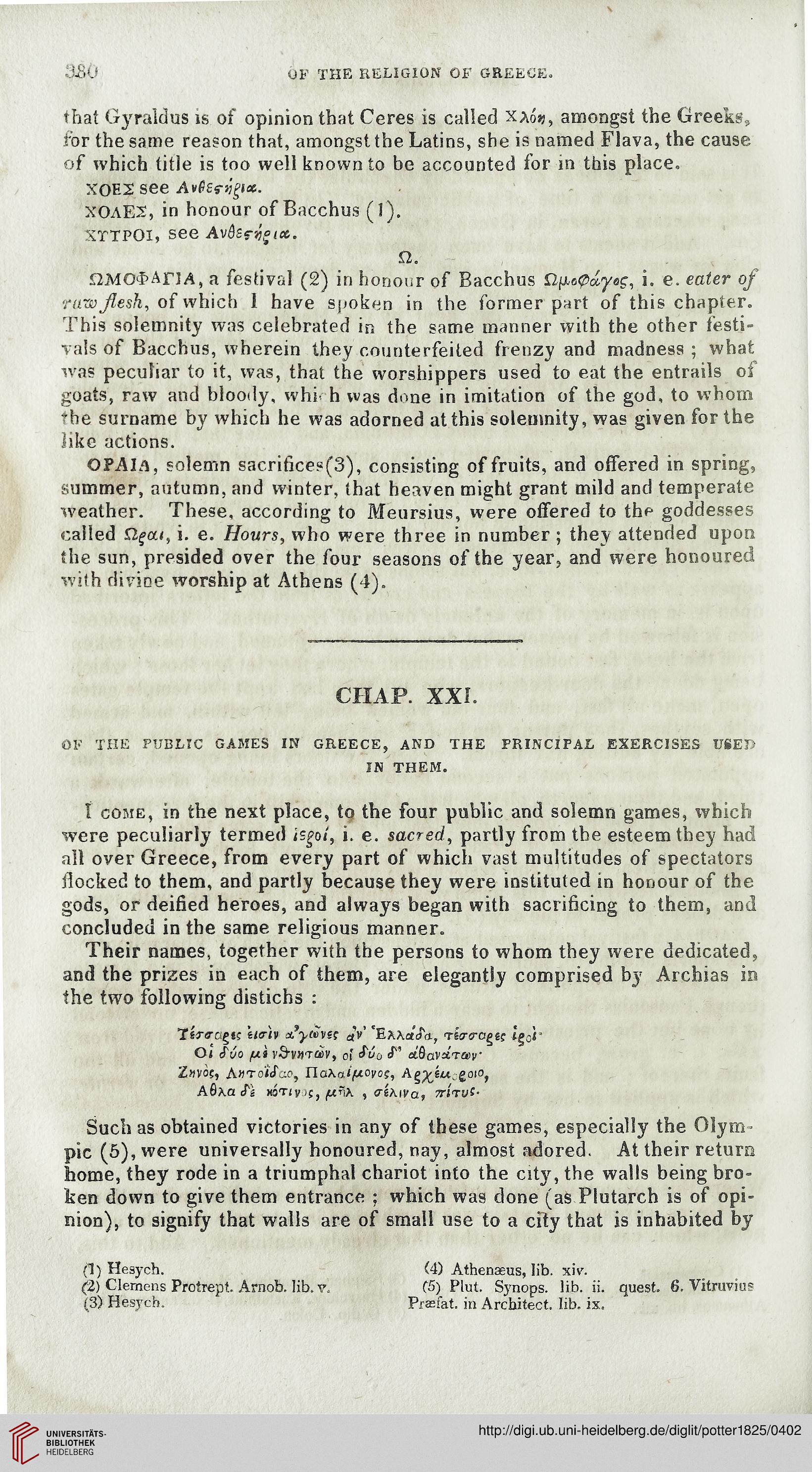§80 of the religion of greece.
that Gyraldus is of opinion that Ceres is called xa6«, amongst the Greeks,
for the same reason that, amongst the Latins, she is named Flava, the cause
of which title is too well known to be accounted for in this place.
x0e2 see Avtee-vgix.
XOAES, in honour of Bacchus (J).
XTTPOIj see Av$£?y°ict.
n.
J2MO<I>AriA, a festival (2) in honour of Bacchus n^c0<iyeg, i. e. eater of
raw flesh, of which 1 have spoken in the former part of this chapter.
This solemnity was celebrated in the same manner with the other festi-
vals of Bacchus, wherein they counterfeited frenzy and madness ; what
waS peculiar to it, was, that the worshippers used to eat the entrails of
goats, raw and bloody, whi h was done in imitation of the god, to whom
*be surname by which he was adorned at this solemnity, was given for the
like actions.
OFAlA, solemn sacrifice«(3), consisting of fruits, and offered in spring,
summer, autumn, and winter, that heaven might grant mild and temperate
weather. These, according to Meursius, were offered to the goddesses
called ttgai, i. e. Hours, who were three in number ; they attended upon
the sun, presided over the four seasons of the year, and were honoured
with divine worship at Athens (4).
CHAP. XXI.
of the public games in greece, and the principal exercises V&ET)
in them.
I come, in the next place, to the four public and solemn games, which
were peculiarly termed i£|oi, i. e. sacred, partly from the esteem they had
all over Greece, from every part of which vast multitudes of spectators
flocked to them, and partly because they were instituted in honour of the
gods, or deified heroes, and always began with sacrificing to them, and
concluded in the same religious manner.
Their names, together with the persons to whom they were dedicated,
and the prizes in each of them, are elegantly comprised by Archias in
the two following distichs :
Z»voc, Ahto/JUp, ria\a.if*ovos, Ag^Eujgoio,
Aflxa cTs motiv , ftrih , atAiva, 7riru!'
Such as obtained victories in any of these games, especially the Olym -
pic (5), were universally honoured, nay, almost adored. At their return
home, they rode in a triumphal chariot into the city, the walls being bro-
ken down to give them entrance ; which was done (as Plutarch is of opi-
nion), to signify that walls are of small use to a city that is inhabited by
(1) Hesych.
(2) Clemens Protrept. Arnob. lib. v,
(3) Hesych.
(4) Athenaeus, lib. xiv.
C5) Plut. Synops. lib. ii. quest. 6. Vitruvius
Prffiiat. in Architect, lib. ix.
that Gyraldus is of opinion that Ceres is called xa6«, amongst the Greeks,
for the same reason that, amongst the Latins, she is named Flava, the cause
of which title is too well known to be accounted for in this place.
x0e2 see Avtee-vgix.
XOAES, in honour of Bacchus (J).
XTTPOIj see Av$£?y°ict.
n.
J2MO<I>AriA, a festival (2) in honour of Bacchus n^c0<iyeg, i. e. eater of
raw flesh, of which 1 have spoken in the former part of this chapter.
This solemnity was celebrated in the same manner with the other festi-
vals of Bacchus, wherein they counterfeited frenzy and madness ; what
waS peculiar to it, was, that the worshippers used to eat the entrails of
goats, raw and bloody, whi h was done in imitation of the god, to whom
*be surname by which he was adorned at this solemnity, was given for the
like actions.
OFAlA, solemn sacrifice«(3), consisting of fruits, and offered in spring,
summer, autumn, and winter, that heaven might grant mild and temperate
weather. These, according to Meursius, were offered to the goddesses
called ttgai, i. e. Hours, who were three in number ; they attended upon
the sun, presided over the four seasons of the year, and were honoured
with divine worship at Athens (4).
CHAP. XXI.
of the public games in greece, and the principal exercises V&ET)
in them.
I come, in the next place, to the four public and solemn games, which
were peculiarly termed i£|oi, i. e. sacred, partly from the esteem they had
all over Greece, from every part of which vast multitudes of spectators
flocked to them, and partly because they were instituted in honour of the
gods, or deified heroes, and always began with sacrificing to them, and
concluded in the same religious manner.
Their names, together with the persons to whom they were dedicated,
and the prizes in each of them, are elegantly comprised by Archias in
the two following distichs :
Z»voc, Ahto/JUp, ria\a.if*ovos, Ag^Eujgoio,
Aflxa cTs motiv , ftrih , atAiva, 7riru!'
Such as obtained victories in any of these games, especially the Olym -
pic (5), were universally honoured, nay, almost adored. At their return
home, they rode in a triumphal chariot into the city, the walls being bro-
ken down to give them entrance ; which was done (as Plutarch is of opi-
nion), to signify that walls are of small use to a city that is inhabited by
(1) Hesych.
(2) Clemens Protrept. Arnob. lib. v,
(3) Hesych.
(4) Athenaeus, lib. xiv.
C5) Plut. Synops. lib. ii. quest. 6. Vitruvius
Prffiiat. in Architect, lib. ix.




